A Guide to Export Slack Conversation Data
Learn how to export Slack conversation data for compliance, archives, or analysis. Our guide covers every method, from simple exports to advanced API solutions.
You can export your Slack conversation history on any plan, but what you can actually save depends heavily on your account type and admin permissions. For most people, grabbing a history of a public channel is pretty straightforward. For admins on paid plans, however, the options open up significantly, allowing for comprehensive data exports that include private channels and even direct messages.
Why Exporting Slack Data Is a Business Necessity

It's easy to think of Slack as just a chat app, but that misses its real value. In reality, it's the central hub for countless business operations. Day in and day out, critical decisions, project updates, and invaluable institutional knowledge are shared across its channels. That's why being able to export Slack conversation data isn't just a nice-to-have feature—it’s a core part of smart data governance and turning scattered conversations into actionable intelligence.
The sheer scale of the platform drives this point home. With a user base expected to surpass 79 million monthly active users, the information locked inside Slack is an incredibly valuable corporate asset. For the more than a million companies that depend on it, exporting this data is absolutely essential for things like auditing, compliance, and building a searchable knowledge base.
Key Drivers for Exporting Conversations
Think about a few real-world situations where a data export becomes absolutely critical:
- Legal and Compliance: If you're in a regulated field like finance or healthcare, you're required to keep an auditable trail of all communications. An export is the only way to properly respond to eDiscovery requests or handle internal investigations.
- Project Continuity: When a key person leaves the team, their entire project history—all the context, files, and decisions—is sitting in Slack. Exporting their contributions is the best way to ensure a smooth handover and prevent that knowledge from walking out the door.
- Knowledge Management: Turning transient chats into a searchable, permanent knowledge base is a cornerstone of modern knowledge management best practices. Exporting data from Slack is the first step in unlocking the value trapped in your daily conversations.
Actionable Insight: A proactive data export strategy isn't just about saving data; it's about making it useful. The goal is to transform daily chatter into a long-term, searchable asset that your entire team can leverage for better decision-making.
While Slack’s built-in tools give you a starting point, they only deliver raw data. To get real value, you need a way to organize, search, and analyze this information. This is where specialized platforms come in, helping bridge the gap from raw exports to a true https://www.zemith.com/blogs/knowledge-management-systems that provides real, actionable insights.
Choosing the Right Slack Export Method
So, you need to export a Slack conversation. Before you dive in, it’s worth taking a moment to figure out why you need the data. Are you just trying to save a project channel before archiving it, or do you need a complete, auditable record for legal reasons?
Getting this right from the start saves a ton of headaches. Slack gives you a few different ways to pull your data, and each one is built for a specific job.
Quick and Easy: The Standard Export
For most day-to-day needs, the built-in Standard Export is your go-to. This is the simplest option, available right from the Slack interface on any plan. It’s useful for quickly saving the history of a public channel for a project that's wrapped up. It’s fast, doesn’t require any special permissions, and gets the job done for simple archives.
For Admins and Developers: Going Deeper
What if you need more? That’s where the other two methods come into play.
If your organization is on a Business+ or Enterprise Grid plan, you have access to Compliance Exports. This is the heavy-duty option. It allows admins to pull a comprehensive record of everything—including private channels and direct messages. This isn't for casual use; it's a critical tool for meeting legal or regulatory obligations.
The third path is for the tech-savvy: using the Slack API. This route gives you ultimate control and flexibility. You can build custom scripts to schedule recurring exports or even pipe Slack data directly into other business intelligence tools. It’s powerful, but it definitely requires some coding knowledge.
The image below gives a great visual breakdown of the two main built-in export types.
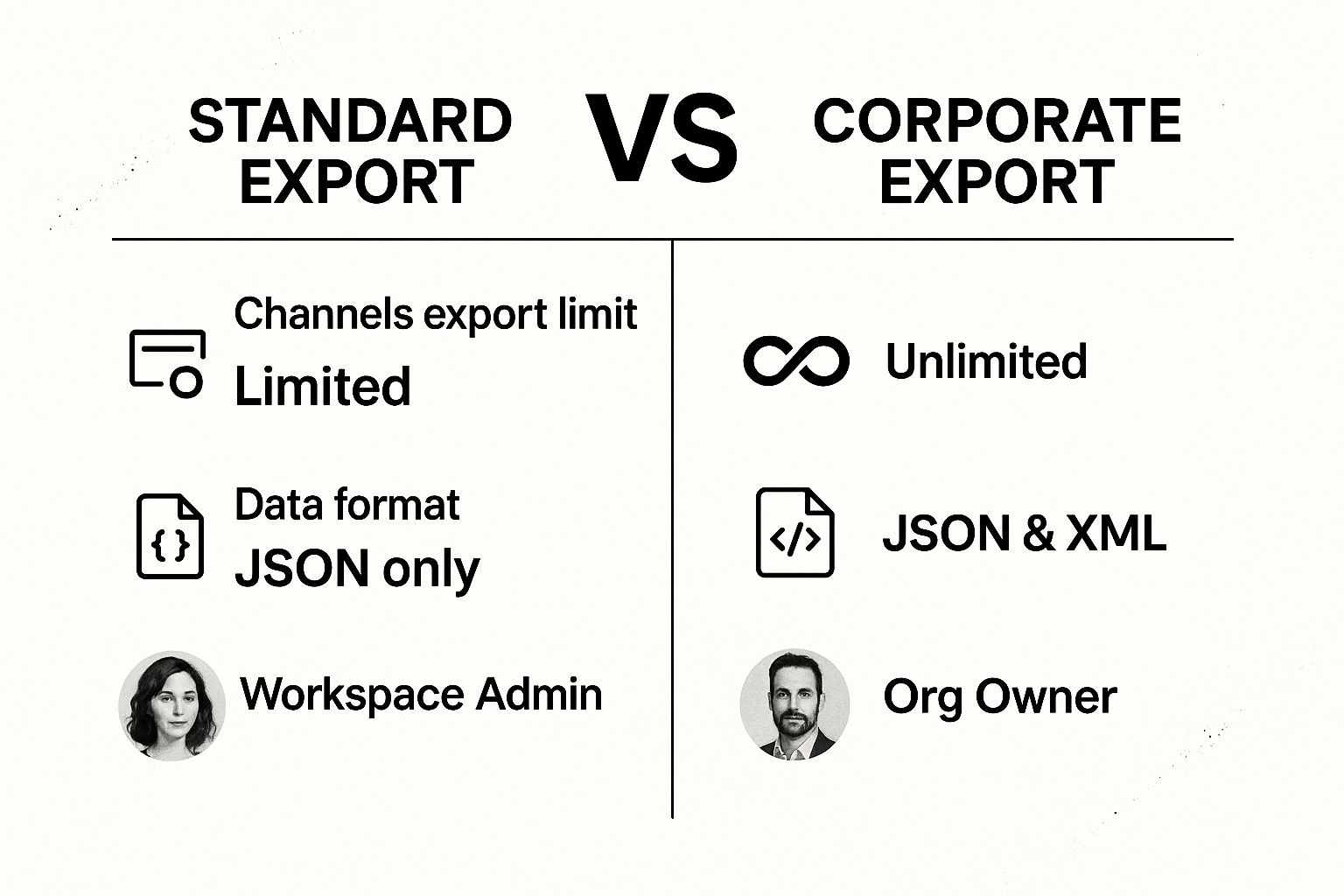
As you can see, the Compliance Export (what Slack used to call Corporate Export) is far more comprehensive, giving organization owners access to everything.
Slack Export Methods at a Glance
To help you decide, here's a quick comparison of the available Slack export methods. This table should make it easy to find the best fit for your needs, whether you're looking for a simple archive or a tool for enterprise-wide compliance.
| Method | Best For | Data Scope | Slack Plan Required | Key Limitation |
|---|---|---|---|---|
| Standard Export | Personal archives, saving public channel history | Public channels only | All plans (including Free) | Can't access private channels or DMs. |
| Compliance Export | Legal holds, eDiscovery, regulatory compliance | All channels, DMs, private conversations, and files | Business+ or Enterprise Grid | Requires admin-level permissions and a paid plan. |
| Slack API | Custom automated backups, data integration | Varies by API and token permissions | All plans (some APIs require paid plans) | Requires technical expertise and development time. |
Ultimately, the choice comes down to your specific requirements for data scope and automation.
Actionable Insight: For teams that need the power of Compliance or API exports without the manual work, a third-party tool like Zemith is the most efficient path. It automates the process, turning messy JSON files into a searchable knowledge base so you can find information instantly.
The Standard Export for Everyday Needs
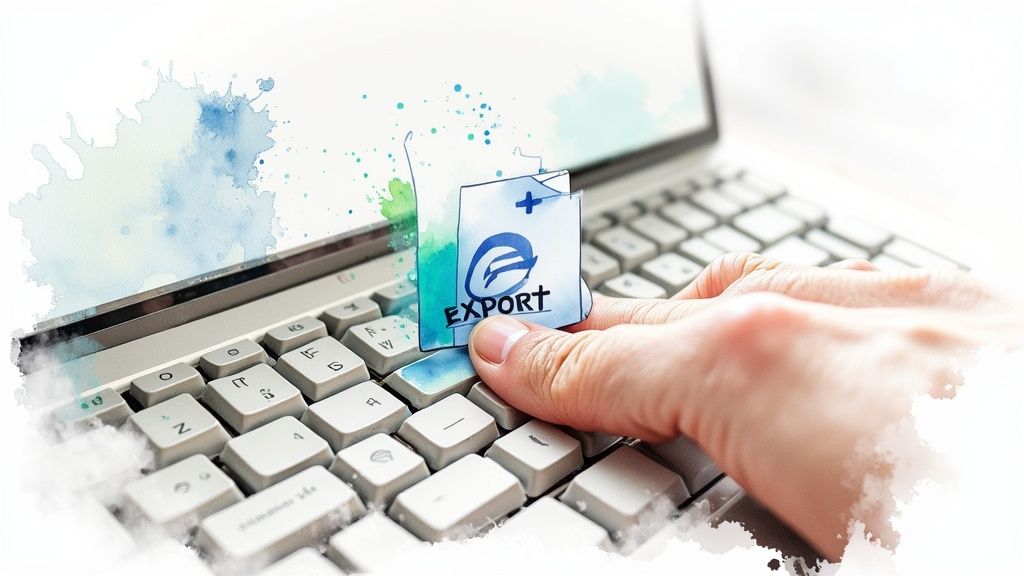
Sometimes you just need a quick and easy way to save a conversation, and for that, Slack's built-in export tool is your go-to. It’s the most straightforward method available, and the best part is that anyone can use it, regardless of their plan—from free community workspaces to large enterprise grids.
This is the perfect tool for personal record-keeping. Think about grabbing a copy of a direct message thread for your own files or saving the history of a project channel before you archive it. You don't need to get an admin involved; you can do it all yourself in just a few clicks.
To get started, you just head into your workspace settings, click over to "Import/Export Data," and pick the date range you're interested in. Slack packages everything up into a ZIP file and sends you a download link via email. It’s that simple.
What You Get (and What You Don't)
Now, it’s important to understand the limitations, which mostly come down to your workspace's subscription plan.
- On the Free Plan? You’ll be able to export the complete message history from any public channels.
- On a Paid Plan? You have more power. You can export your own data from direct messages and any private channels you're in, in addition to public channels.
No matter your plan, the final product is always the same: a ZIP archive filled with JSON files. While computers love this format, it's a nightmare for a human to read. Imagine trying to follow a conversation by digging through lines of code—it’s not practical.
Actionable Insight: The standard export is incredibly fast and accessible, but the raw data is nearly impossible to use. Getting the export is easy; making sense of it is the real challenge. Without a tool to process the JSON, you've archived data you can't actually read or search.
This is where most people hit a snag. If you're not a developer, those JSON files are essentially gibberish. While you can find online viewers to get a peek, they are clunky and don't work well for anything beyond a quick check.
For anyone who needs to convert those messy files into a readable, searchable, and genuinely useful archive, a dedicated platform is the answer. For example, a tool like Zemith can take those raw JSON files and automatically transform them into a clean, easy-to-read conversational format. This saves you from a massive technical headache and lets you get back to what matters: the conversation itself.
When You Need a Complete Workspace Export for Audits
Sometimes, a simple personal archive just won't cut it. When you're facing a legal hold, an eDiscovery request, or a full-blown regulatory audit, you need to export Slack conversation data from your entire workspace. This is exactly what Slack's Compliance Exports were built for.
This feature is a serious tool, available exclusively for organizations on the Business+ or Enterprise Grid plans. It's not something just anyone can do; access is restricted to Workspace Owners or Admins. The key difference here is the scope—this isn't about one person's data. It’s about capturing a complete record of communications across every corner of your workspace, including all public channels, private channels, and every single direct message (DM).
The Power and the Problem
For businesses in regulated fields like finance or healthcare, or for any company dealing with legal matters, this kind of comprehensive export is absolutely essential. It delivers the official, tamper-proof record you need for legal requests, internal investigations, or enforcing data retention policies. An admin simply requests the export from Slack for a specific date range and receives a download link for the entire archive.
But here’s the catch. While incredibly powerful, this method has some major practical downsides. The export process is entirely manual and can be slow. An admin has to kick off every single request. The biggest hurdle, however, is what you get back: a massive collection of dense JSON files. For anyone who isn't a developer, this format is practically unreadable, let alone searchable.
Actionable Insight: The raw data from a Compliance Export is a goldmine for legal and HR teams, but it’s delivered in a format that makes finding specific information nearly impossible. To make this data actionable, you need a system to parse, index, and search it efficiently.
This is where the process breaks down for most teams and where automation becomes a necessity. Manually sifting through thousands of JSON files is more than just inefficient; it's a recipe for mistakes and missed information. A specialized service like Zemith can step in to handle this. It can automatically process these complex archives, turning the raw, jumbled data into a structured, searchable, and human-friendly format. What was once a painful compliance chore becomes a streamlined process, letting you pinpoint the exact information you need in moments.
Automating Exports with the Slack API
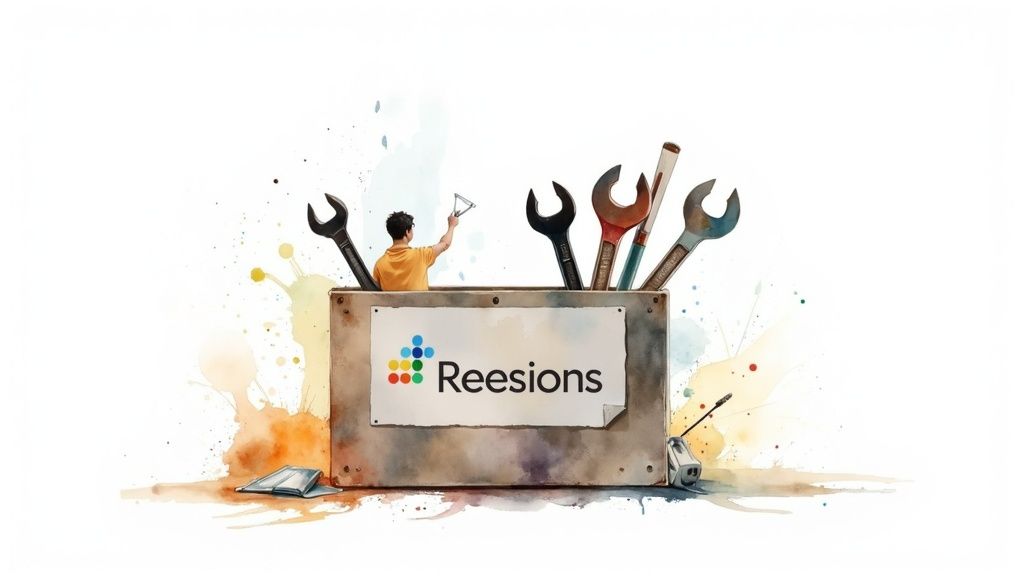
When a simple one-time data dump won't cut it, you'll need to turn to the Slack API. This is the power user's route, perfect for anyone who needs to build a custom, repeatable system for exporting conversations. Think scheduled backups, filtered data streams, or even direct integrations with other business tools.
It's definitely a more technical approach, but the flexibility you gain is enormous. You're essentially building a small, custom Slack app, giving it the right permissions (what Slack calls "scopes"), and then using code to tell it what to do. The go-to tool for this job is the conversations.history endpoint, which lets you programmatically pull messages from any channel you have access to.
With this, you can move beyond simple archiving. You could, for instance, pipe conversations directly into a data warehouse for analysis or send customer feedback from a specific channel right into your CRM.
The screenshot here shows the official Slack documentation for that conversations.history method. It gives you a glimpse into what a developer sees—the specific parameters like channel ID they'd use to target and retrieve the exact data they need.
The Power of API Automation
The real magic of the API is creating workflows that fit your business perfectly. Imagine setting up a script that, every night at midnight, automatically exports all messages from your #sales-wins channel and drops them into a company-wide analytics dashboard. That's the kind of hands-off, custom solution that can make a huge difference.
Taking this approach often gets you thinking about other efficiencies. When you start to master strategies to automate repetitive tasks, you begin to see opportunities everywhere to reduce manual work.
Actionable Insight: The Slack API gives you the keys to the kingdom, allowing for custom exports on your schedule. But this power comes with a significant trade-off: it requires developer resources and ongoing maintenance to be a reliable system.
This is a common sticking point. Many teams need the power of an API-driven export but don't have the in-house developers to build and maintain a custom script. For those caught in the middle, a platform like Zemith can be the perfect solution. It delivers the control of an API—scheduling, filtering, and powerful searching—without requiring you to write a single line of code.
It’s a smart way to approach document workflow automation, seamlessly connecting the dots between your team's communication hub and its long-term knowledge base.
Frequently Asked Questions
When it comes to getting your data out of Slack, a lot of questions pop up. It's not always straightforward, so let's clear up some of the most common points of confusion I see.
Can I Export Conversations From a Workspace I Don't Own?
Yes, you can, but with some big limitations. Any member of a Slack workspace, on any plan, can export their own direct messages and the history from any public channels they've joined.
The real restriction comes with private channels and other people's DMs. You can't export a private channel you're in unless you're a Workspace Owner. For the full picture—every channel, all direct messages, the works—you'll need a Workspace Owner on a Business+ or Enterprise Grid plan to request a special Compliance Export.
What Format Is Exported Slack Data and How Can I Read It?
Slack packages everything up for you in a ZIP archive, but inside you'll find a collection of JSON (JavaScript Object Notation) files. This format is fantastic for computers to read, but for a person trying to follow a conversation, it's a jumbled mess.
You could use a free online JSON viewer to peek at the data, but it gets overwhelming fast if you have more than a handful of messages. This is a classic problem in effective research data management, where the first step is often just making raw data usable.
Actionable Insight: Don't waste time trying to manually read raw JSON exports. The most effective path is using a specialized tool like Zemith that can instantly parse these files and display them in a clean, searchable format that looks and feels like a real conversation.
Does Exporting a Slack Conversation Notify Other Users?
Nope. When you run a standard export for your own messages or public channels, it's a completely private action. No one else in the workspace gets a notification.
The same goes for the big administrative exports. When a Workspace Owner kicks off a Compliance Export for legal or auditing reasons, the process is entirely discreet. Individual users are not alerted, which is crucial for maintaining confidentiality during internal reviews.
Ready to transform your messy Slack exports into a powerful, searchable knowledge base? Zemith is an all-in-one AI platform that can instantly organize your exported data, making it easy to find what you need. Stop wrestling with JSON files and start getting answers. Explore what you can build at https://www.zemith.com.
Explore Zemith Features
Introducing Zemith
The best tools in one place, so you can quickly leverage the best tools for your needs.
All in One AI Platform
Go beyond AI Chat, with Search, Notes, Image Generation, and more.
Cost Savings
Access latest AI models and tools at a fraction of the cost.
Get Sh*t Done
Speed up your work with productivity, work and creative assistants.
Constant Updates
Receive constant updates with new features and improvements to enhance your experience.
Features
Selection of Leading AI Models
Access multiple advanced AI models in one place - featuring Gemini-2.5 Pro, Claude 4.5 Sonnet, GPT 5, and more to tackle any tasks
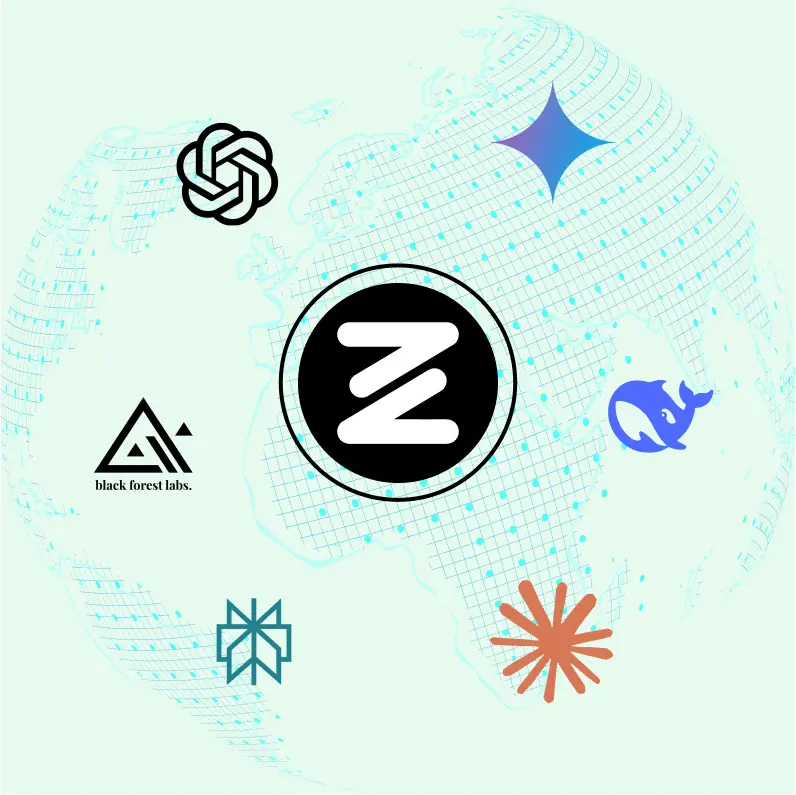
Speed run your documents
Upload documents to your Zemith library and transform them with AI-powered chat, podcast generation, summaries, and more
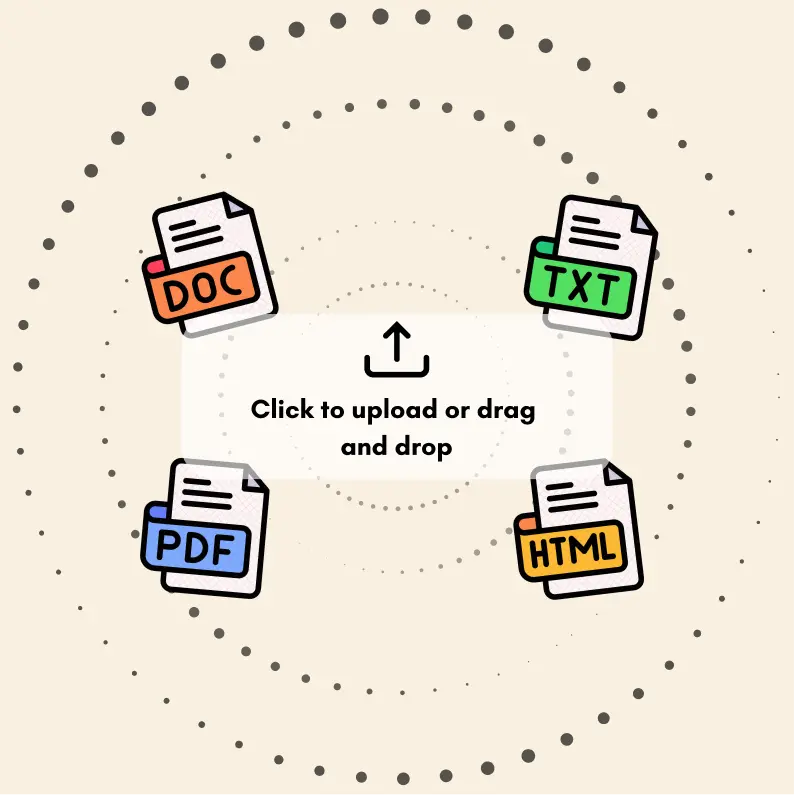
Transform Your Writing Process
Elevate your notes and documents with AI-powered assistance that helps you write faster, better, and with less effort
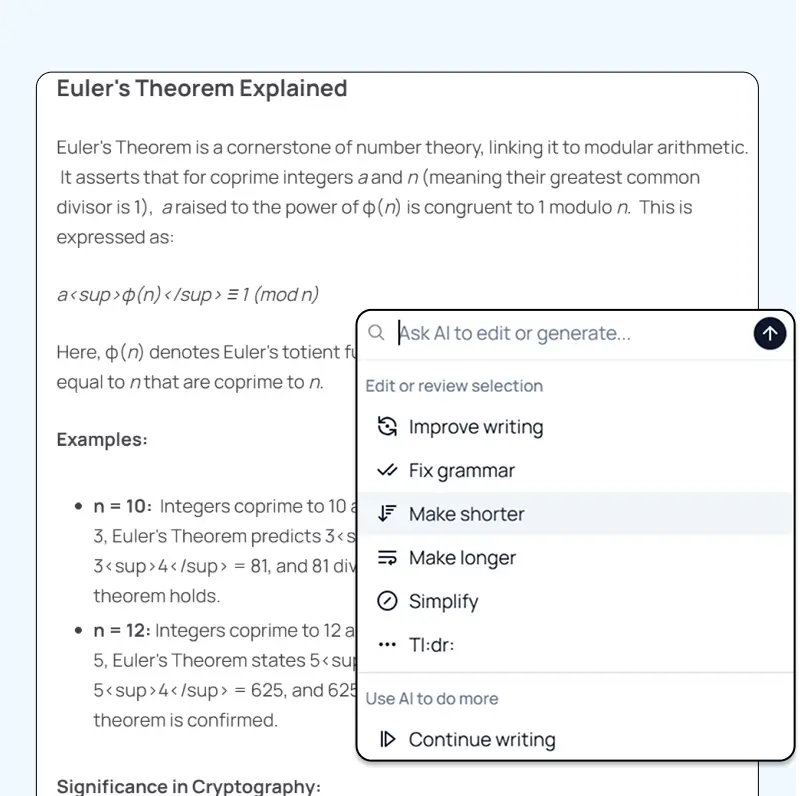
Unleash Your Visual Creativity
Transform ideas into stunning visuals with powerful AI image generation and editing tools that bring your creative vision to life

Accelerate Your Development Workflow
Boost productivity with an AI coding companion that helps you write, debug, and optimize code across multiple programming languages
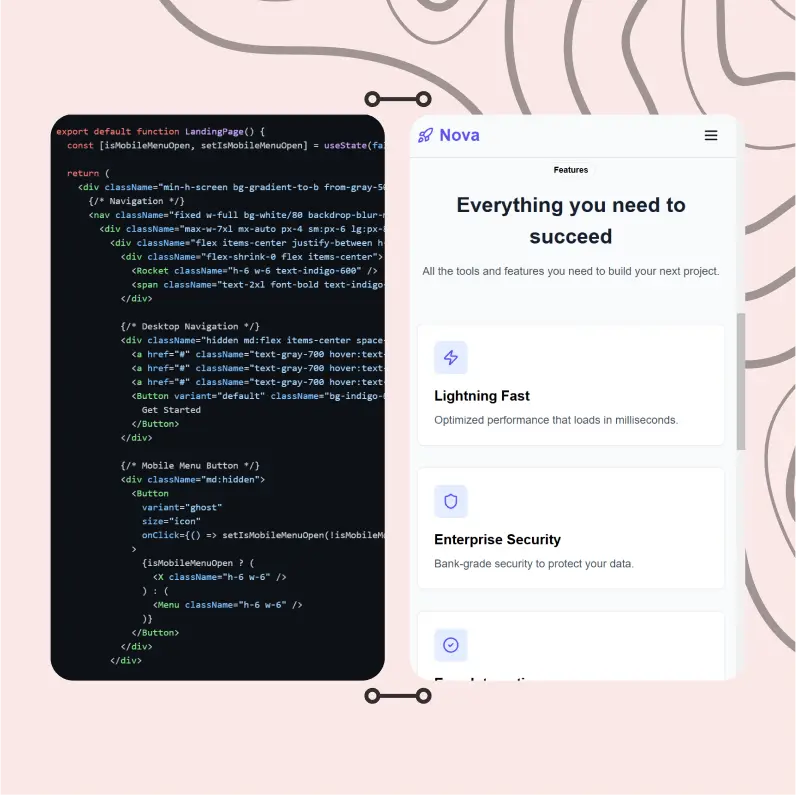
Powerful Tools for Everyday Excellence
Streamline your workflow with our collection of specialized AI tools designed to solve common challenges and boost your productivity
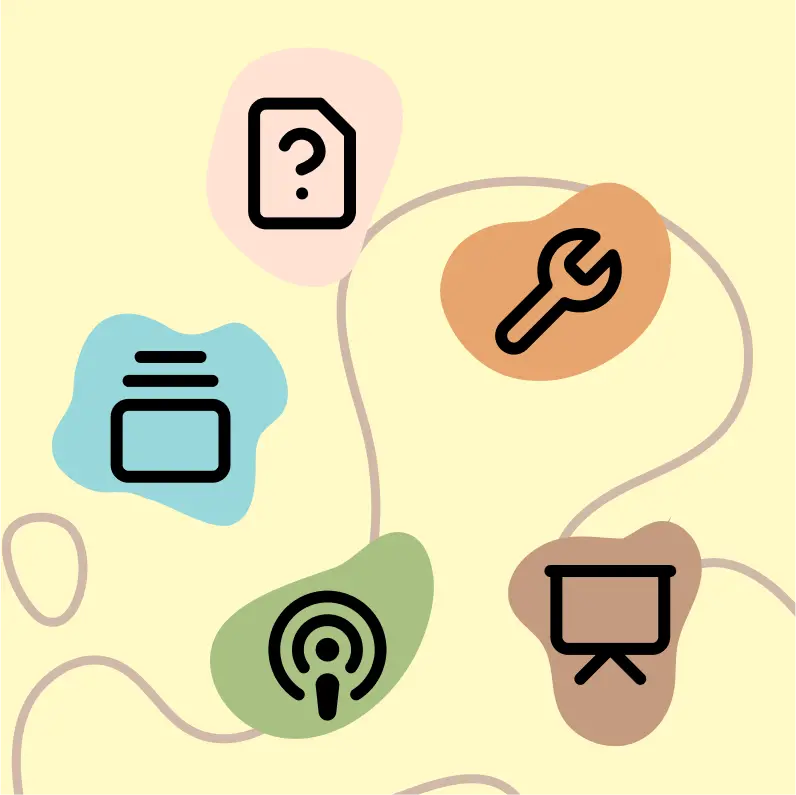
Live Mode for Real Time Conversations
Speak naturally, share your screen and chat in realtime with AI
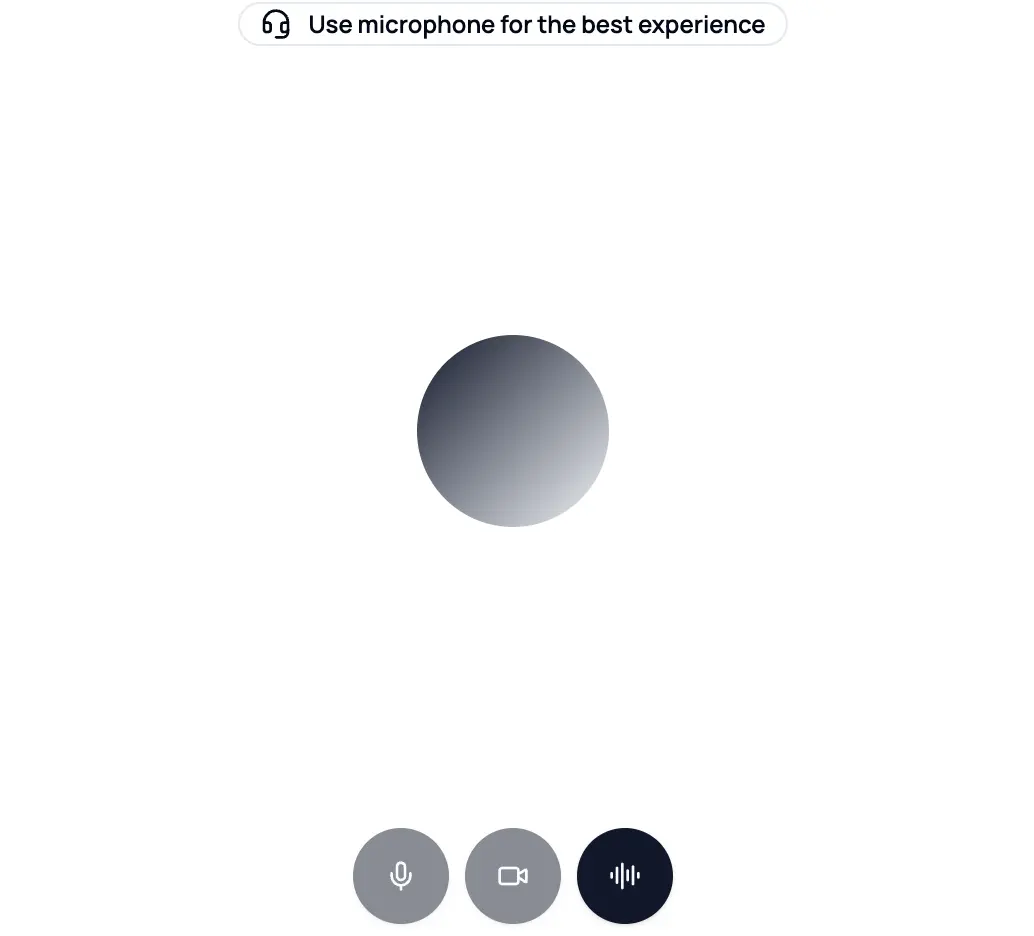
AI in your pocket
Experience the full power of Zemith AI platform wherever you go. Chat with AI, generate content, and boost your productivity from your mobile device.

Deeply Integrated with Top AI Models
Beyond basic AI chat - deeply integrated tools and productivity-focused OS for maximum efficiency
Straightforward, affordable pricing
Save hours of work and research
Affordable plan for power users
Plus
- 10000 Credits Monthly
- Access to plus features
- Access to Plus Models
- Access to tools such as web search, canvas usage, deep research tool
- Access to Creative Features
- Access to Documents Library Features
- Upload up to 50 sources per library folder
- Access to Custom System Prompt
- Access to FocusOS up to 15 tabs
- Unlimited model usage for Gemini 2.5 Flash Lite
- Set Default Model
- Access to Max Mode
- Access to Document to Podcast
- Access to Document to Quiz Generator
- Access to on demand credits
- Access to latest features
Professional
- Everything in Plus, and:
- 21000 Credits Monthly
- Access to Pro Models
- Access to Pro Features
- Access to Video Generation
- Unlimited model usage for GPT 5 Mini
- Access to code interpreter agent
- Access to auto tools
- 10000 Credits Monthly
- Access to plus features
- Access to Plus Models
- Access to tools such as web search, canvas usage, deep research tool
- Access to Creative Features
- Access to Documents Library Features
- Upload up to 50 sources per library folder
- Access to Custom System Prompt
- Access to FocusOS up to 15 tabs
- Unlimited model usage for Gemini 2.5 Flash Lite
- Set Default Model
- Access to Max Mode
- Access to Document to Podcast
- Access to Document to Quiz Generator
- Access to on demand credits
- Access to latest features
- Everything in Plus, and:
- 21000 Credits Monthly
- Access to Pro Models
- Access to Pro Features
- Access to Video Generation
- Unlimited model usage for GPT 5 Mini
- Access to code interpreter agent
- Access to auto tools
What Our Users Say
Great Tool after 2 months usage
simplyzubair
I love the way multiple tools they integrated in one platform. So far it is going in right dorection adding more tools.
Best in Kind!
barefootmedicine
This is another game-change. have used software that kind of offers similar features, but the quality of the data I'm getting back and the sheer speed of the responses is outstanding. I use this app ...
simply awesome
MarianZ
I just tried it - didnt wanna stay with it, because there is so much like that out there. But it convinced me, because: - the discord-channel is very response and fast - the number of models are quite...
A Surprisingly Comprehensive and Engaging Experience
bruno.battocletti
Zemith is not just another app; it's a surprisingly comprehensive platform that feels like a toolbox filled with unexpected delights. From the moment you launch it, you're greeted with a clean and int...
Great for Document Analysis
yerch82
Just works. Simple to use and great for working with documents and make summaries. Money well spend in my opinion.
Great AI site with lots of features and accessible llm's
sumore
what I find most useful in this site is the organization of the features. it's better that all the other site I have so far and even better than chatgpt themselves.
Excellent Tool
AlphaLeaf
Zemith claims to be an all-in-one platform, and after using it, I can confirm that it lives up to that claim. It not only has all the necessary functions, but the UI is also well-designed and very eas...
A well-rounded platform with solid LLMs, extra functionality
SlothMachine
Hey team Zemith! First off: I don't often write these reviews. I should do better, especially with tools that really put their heart and soul into their platform.
This is the best tool I've ever used. Updates are made almost daily, and the feedback process is very fast.
reu0691
This is the best AI tool I've used so far. Updates are made almost daily, and the feedback process is incredibly fast. Just looking at the changelogs, you can see how consistently the developers have ...
